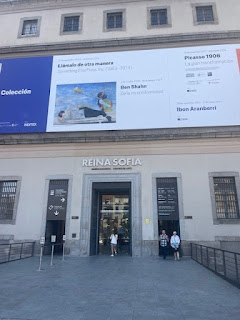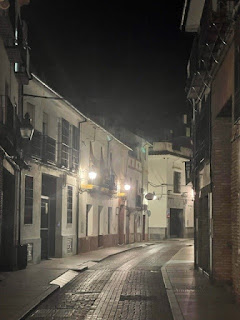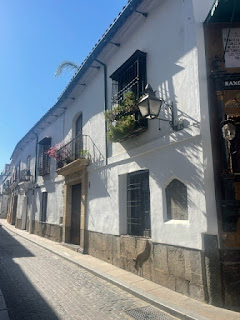Wow, Madrid! The culture, the cuisine, and the rich history that one senses with every step. The Plaza Mayor, below, is the center of a 17th-century historic district. Lined with cafes and shops, it attracts tourists and locals alike.
Cava is a ubiquitous refreshment in Spain, perhaps best enjoyed from one of the city's many rooftop cafes.
The architecture throughout the city is stunning.
We visited the art museum Thyssen-Bornesmisza in the morning, where photos are not allowed, and then the Reina Sofia, home to Picasso's famed Guernica.
The Guernica, painted in 1937, followed the brutal carpet bombing of the Basque market town. General Franco allowed Hitler's air force to practice by brutally leveling Guernica and setting the stage for the bombing campaigns of WWII. Picasso vowed never to return to Spain so long as Franco remained in power. Sadly, the dictator outlived him.
As the museum does with several other paintings in its collection, it provides exhibits that lend historical context to the artwork. Note the photo of the 1937 Paris Exposition, with its dueling Soviet and German exhibitions, and the war time posters below.
The works of numerous other famous artists are on display, including Salvador Dali's The Great Masturbator.
Photos are allowed in only a few rooms in the sprawling Royal Palace, a warren of 2800 rooms and an astonishing, ostentatious, interior. The Palace is still in use today for formal affairs of state.
Madrid is home to the oldest continuously-operating restaurant in the world, El Botin, known for its suckling pig.
The omnipresent Iberian jamon, along with a wide variety of tapas and cavas, are available seemingly everywhere.
As in other Spanish cities, nuns often prepare and sell sweets to the public. The transaction typically occurs with a revolving turnstile so that the nuns are never seen by the customers.
The Prado Museum does not allow photos, but contains more than 3,000 works, including those of Titian, Raphael, and Hieronymus Bosch's Garden of Earthly Delights.
Madrid is home to the largest bullfighting ring in Spain.
Retiro Park, once reserved for royalty, was opened to the public by King Charles in the 18th century. Its 300-acres provide Madrilenos with a respite from the bustle of city life.
Many venues in Madrid offer flamenco entertainment, and we enjoyed the dinner and show at Corral de la Moreria. The singing and guitar playing were beautifully poignant, and the dancing was stellar. The rapidity of the dancers' footwork was mind-boggling--especially after a few cavas.


































































